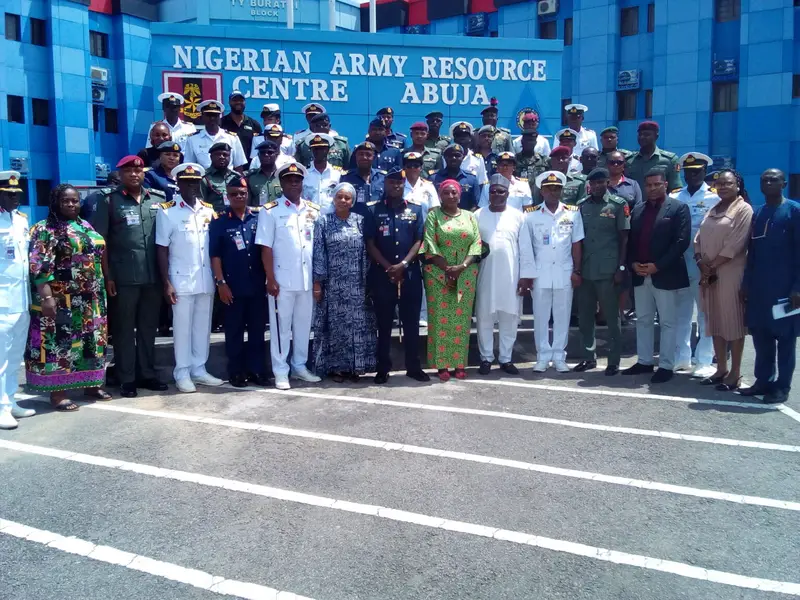By Sumaila Ogbaje
The Defence Headquarters (DHQ) has reaffirmed its commitment to prioritising the mental well-being of troops and other personnel of the Armed Forces of Nigeria.
The Chief of Defence Staff (CDS), Gen. Christopher Musa, gave the assurance on Tuesday in Abuja, at the 2025 World Mental Health Day Symposium organised by the Department of Defence Civil Military Relations in collaboration with Secure the Future.
The Symposium has as theme ”Access to Services: Mental Health in Catastrophes and Emergencies”.
Musa represented by AVM Olusola Akinboyewa, Director, Defence Civil–Military Relations, stressed that the strength of the military was not only measured by its firepower but also by the emotional stability of its men.
He said the theme was timely and relevant, noting that mental health must be treated as a vital component of national response during crises.
He observed that members of the armed forces were often at the forefront of emergencies, exposed to stress, trauma, and fatigue while providing relief, security, and stability in difficult conditions.
”This underscores the critical importance of ensuring that mental health care is not an afterthought, but an integral part of our collective response to crises; whether during conflicts, natural disasters, or humanitarian emergencies.
”The unseen wounds of stress, trauma, and fatigue can be just as debilitating as physical injuries.
”We recognise that a resilient military force requires both physical and psychological fitness, hence the Defence Headquarters’ partnership with SDF to strengthen awareness, early intervention, and access to quality mental health services.
”Through this collaboration, we reaffirm our commitment to promoting awareness, early intervention, and access to quality mental health services, particularly in demanding operational environments,” he said.
The defence chief commended the organisers for providing a platform for knowledge sharing and institutional capacity building on mental health support during emergencies.
He urged participants to extend the message to their units and communities to help normalise conversations around mental health and ensure that no one suffered in silence.
”Together, we can normalise conversations around mental health and ensure that no one suffers in silence,” he stressed.
The Founder of SDF, Mrs Saidatu Adamu, called for stronger collaboration and practical action to make mental health care accessible and a priority across all sectors, especially within the armed forces.
Adamu said the symposium was not just another event, but a call to action to ensure mental health became a strategic necessity and not an afterthought.
According to her, mental health is not merely a health concern; it is a national security imperative. A mentally healthy force is an effective, resilient, and mission-ready force.
”There is the need for early intervention mechanisms, sound policy frameworks, and counseling support to help personnel cope with trauma and stress.”
In his lecture, Prof. Taiwo Sheik, a Professor of Psychiatry at the Ahmadu Bello University, Zaria, described mental health as a national crisis that demanded urgent attention, particularly among ”military personnel” serving in conflict zones.
Sheik, speaking on the topic, ”Mental Health as a Pillar of National Security”, said Nigeria, like the rest of the world, was faced with a growing burden of mental health conditions that cut across all communities, including the armed forces.
”Mental health is a global crisis, and Nigeria is not an exception. The military is part of the Nigerian community, and they face even more severe determinants of mental health conditions than the general population,” he said.
The don noted that the prevalence of mental health challenges in conflict areas was significantly higher than in other settings.
According to him, more than one in five people living in conflict zones suffer mental health conditions, compared to one in eight in the general population worldwide.
He explained that mental health conditions vary in severity, ranging from mild to moderate to severe, adding that many affected individuals continued to function in society while silently battling stress, depression, or anxiety.
”With a population of about 230 million, this means nearly 50 million Nigerians may be living under the burden of mental health conditions at any point in time,” he said.
Sheik urged government and policymakers to prioritise mental health in the military, develop governance structures that promote psychological well-being, and ensure accessible, stigma-free treatment for those in need.
”Our policymakers and lawmakers must allocate resources for mental health care for the military. It’s not just a military issue, it is a societal responsibility to care for those who defend our nation,” he emphasised. (NAN)

